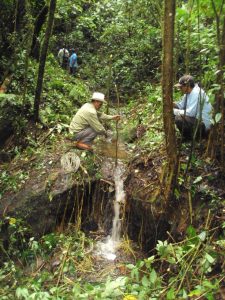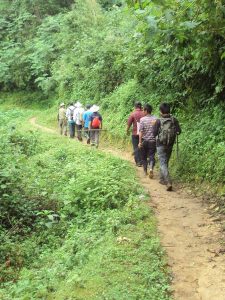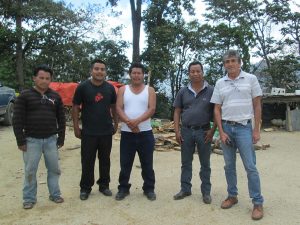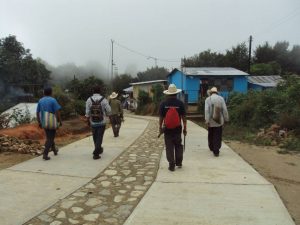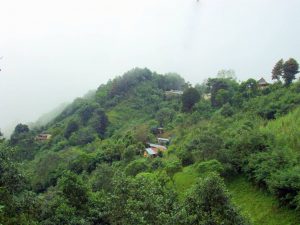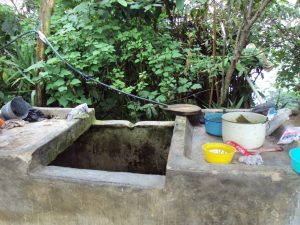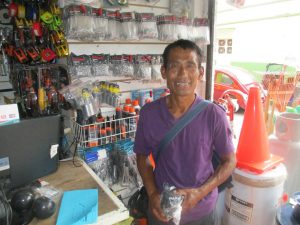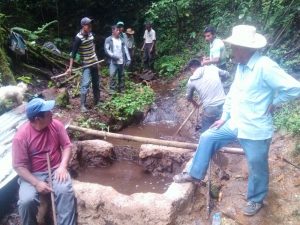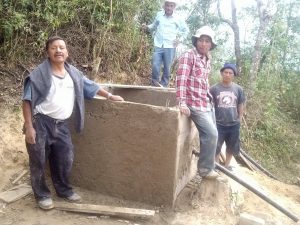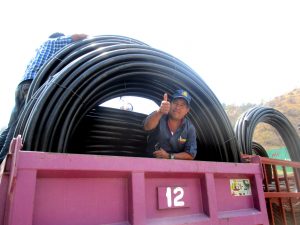This Sierra Madre de Chiapas project is made possible through the partnership of WATER CHARITY and the NATIONAL PEACE CORPS ASSOCIATION.
This project has been completed. To read about the conclusion, CLICK HERE.
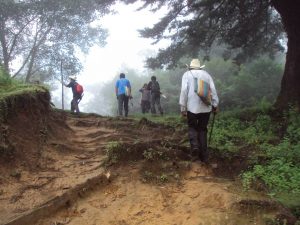 Location
Location
Checute, Motozintla, Chiapas, Mexico
Community Description
Deep in the Sierra Madre on the Mexico/Guatemala border lies a community called Checute, 48 homes situated on a ridge bordered by canyons on either side. The community is located in the Municipality of Motozintla, close to the border with Guatemala.
Checute residents are subsistence farmers. In a given year, their well-being depends on there being enough rainfall to allow them to bring in the corn and beans they raise to feed their families. They do not grow cash crops, but only have a few coffee plants and vegetables for their own use. The past two years have seen drought conditions that threatened crop failure, which would have put their survival in jeopardy.
Like the majority of people in the impoverished Sierra Madre region, their ability to build a house of solid material, to pay for unexpected medical costs, or to obtain a used truck which would open up possibilities of more work, depend on someone from the family making the dangerous trip to the U.S. to find work in fields or meatpacking plants that allows them to send money home.
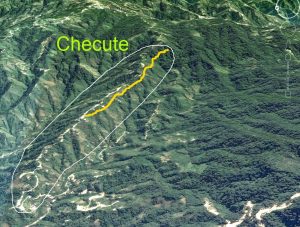 Problem Addressed
Problem Addressed
The community is located on a long ridge that is high above the river canyon. Forty-eight families with a total of 242 people do not have access to water. Many of these households are made up of 9, 10 or more members making life difficult when they have to haul water from far away.
Children from other communities walk to Checute to attend one of three schools there. The primary school has 200 students, the “telesecundaria” middle school has 150 and the kindergarten has 50. None of the schools has adequate water for sanitation. A man has to work every day to fix a flimsy ½” hose that brings water to one of the schools from a long-distance away.
Project Description
This project is to build a system to bring an ample supply of safe water to Checute.
The project will be supervised by the Sexto Sol Center, an NGO that has 20 years of experience working with communities in the Sierra Madre region of Chiapas.
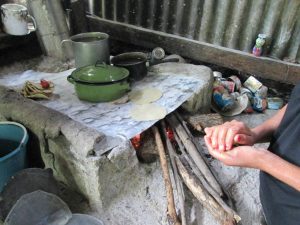 There is a water source 3.5 kilometers away from the village that flows all year long. Men from the community will open a track through the forest with hand tools, where the hose will traverse the steep mountainside. They will build 6 small registers of cement and cinder block that protect the line from too much pressure and to aid in maintaining the system.
There is a water source 3.5 kilometers away from the village that flows all year long. Men from the community will open a track through the forest with hand tools, where the hose will traverse the steep mountainside. They will build 6 small registers of cement and cinder block that protect the line from too much pressure and to aid in maintaining the system.
The supply line will be 2” polyduct hose, buried to prevent animals from damaging it, and keeping it safe from damage from the sun or vandals. This type of hose is superior to PVC for this purpose because it is flexible, durable, and long-lasting. It is sourced from a factory that manufactures it from 100% post-consumer waste plastic.
The hose will be run to a water tank, from which water will be distributed to the houses. The best site for this has been found and permission to use the land was granted. They have received initial confirmation that the municipality of Motozintla is willing to provide the materials they need for that construction.
In the eventuality that the City is not able to provide those funds, the leaders of Checute have told Sexto Sol that the community desperately needs the water hose which they say they will make work with a temporary situation until such time as they can build the tank.
The work will be done by members of the community, especially those with children in the various schools.
Project Impact
242 people will benefit from the project.
Project Managers
Tamara Brennan, PhD., with technical supervision by Francisco Barrios.
Monitoring and Maintenance
The residents of Checute will monitor and maintain the system. Sexto Sol will periodically check to ascertain that the system is functioning properly.
Comments
This project is the 10th water system project in the ongoing Sierra Madre Water Program, a comprehensive effort to improve water access in the underserved and impoverished Sierra Madre de Chiapas region of Mexico, spanning the border with Guatemala. These projects are designed, implemented, and funded by Water Charity in partnership with the local NGO the Sexto Sol Center for community development.
In addition, Tamara Brennan, Ph.D., Sexto Sol’s Executive Director, will provide capacity building to help people better manage their domestic water. This will include preventing waste water from pooling on the ground where animals consume it and become ill. With simple changes, usable gray water can be directed into edible plants. She will also provide a demonstration on how to recycle plastic into useful items as a strategy to keep it out of the watershed and prevent contamination of the environment.
Fundraising Target
$6,100
Funds raised in excess of the project amount will be allocated to other projects in the country.
Donations Collected to Date
$6,100
Dollar Amount Needed
$0.00 – This project has been fully funded, through the generosity of Michael and Carla Boyle, of Nelsonville, OH, USA.
Any additional donations will be directed toward new projects in Mexico.
Conclusion of Checute Water System Project – Mexico
This project has been completed under the direction of Tamara Brennan, PhD., of Sexto Sol. To read about the start of the project, CLICK HERE.
The project was designed to build a system to bring an ample supply of safe water to Checute.
Tamara reports:
The people in Checute are now enjoying the benefits of being able to count on having water on tap in their homes for the first time. They say that this project has made a significant improvement in their lives. As one man put it, “I haven’t had to waste one day checking on my water hose in weeks. I may just leave it there for the squirrels.” For years his family had relied on a ½ inch hose that brought a trickle of water from a small spring several kilometers away. This kind of system, so typical in the region, requires constant maintenance even including patching hard to find holes when thirsty squirrels chew through it. In the spring the water dried up leaving the family to wait months until the rainy season.
The work in Checute as originally planned for this project changed in the doing as unforeseen contingencies arose. When the rains started it became obvious that they would need to build the small dam higher up the mountain where the water was clearer. Also, the water tank was finally built on another location when it was obvious that it would provide more favorable conditions for managing the pressure of the water flow from a high elevation. This was a good decision.
When the original group of families first planned their project, they had invited more neighbors to join them in order to share the benefits with as many as possible. Many of those families declined. However, once it was apparent that the water would be flowing, more families asked to be allowed to join. This has greatly increased the number of people who are benefiting from the work by more than 15 households.
In addition, now that it is the rainy season and the flow from the creek is high, the water overflows the tank. With this surplus of water, the people have had to let it flow off the side of the mountain. A community nearby has asked if there might be a way they could benefit from the surplus water, a proposal that Checute is considering moving forward. The community is more united as a result of having worked together to carry heavy rolls of hose over difficult terrain and all the other work required to make this project a reality. These are welcome developments that have made the benefit of building this water system much more than anticipated.
During the celebration of the completion of the project, the people expressed their deepest gratitude to Mike and Carla Boyle for having come from so far away to meet them and for their having sponsored the project. They were moved that people from a world away so to speak would care to help them improve their lives.
We extend our thanks to Tamara for completing this important project and again thank the Boyles for their generosity in providing the funds for the project.
